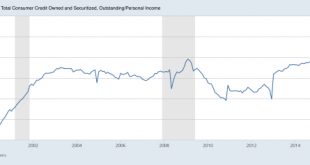from Dean Baker As president, Donald Trump has continued to use the same protectionist rhetoric he used during the campaign, even though he has not done much to date to follow through with protectionist policies. Nonetheless, his comments have prompted outrage among most of the media, which is committed to supporting the trade policies of recent administrations. In this respect it is striking how the media slavishly follow the major features of recent trade agreements as the definition of...
Read More »Redefining economics in terms of multidimensional analysis and democracy
from Peter Söderbaum, “Do we need a new economics for sustainable development?”, real-world economics review, issue no. 80, 26 June 2017, pp. 32-44. A proposed new theoretical perspective starts with a partly different definition of economics: “Economics is multidimensional management of (limited) resources in a democratic society” Why “multidimensional” management? Multidimensional goes against the one-dimensional analysis of neoclassical theory and method. “Monetary reductionism” is no...
Read More »Three Methodologies
from Asad Zaman This is a summary of the introduction/motivation part of Lecture 15 on Advanced Microeconomics II, delivered at PIDE in Spring Semester 2017. The lecture is about 19th Century European History, and how it is deeply entangled with Modern Economic Theory. We cannot understand one without the other. 19th Century European Economic Ideas In Historical Context. “… the race is not always to the swift, nor the battle to the strong …” Ecclesiastes 9:11 In the late 19th century, a...
Read More »Ricardo’s trade paradigm — a formerly true theory
from Lars Syll Two hundred years ago, on 19 April 1817, David Ricardo’s Principles was published. In it he presented a theory that was meant to explain why countries trade and, based on the concept of opportunity cost, how the pattern of export and import is ruled by countries exporting goods in which they have comparative advantage and importing goods in which they have a comparative disadvantage. Although a great accomplishment per se, Ricardo’s theory of comparative advantage, however,...
Read More »Globalization—how did they get it so wrong?
from David Ruccio There is perhaps no more cherished an idea within mainstream economics than that everyone benefits from free trade and, more generally, globalization. They represent the solution to the problem of scarcity for the world as a whole, much as free markets are celebrated as the best way of allocating scarce resources within nations. And any exceptions to free markets, whether national or international, need to be criticized and opposed at every turn. That celebration of...
Read More »The balanced budget paradox
from Lars Syll The balanced budget paradox is probably one of the most devastating phenomena haunting our economies. The harder politicians — usually on the advise of establishment economists — try to achieve balanced budgets for the public sector, the less likely they are to succeed in their endeavour. And the more the citizens have to pay for the concomitant austerity policies these wrong-headed politicians and economists recommend as “the sole solution.” One of the most effective ways...
Read More »Digital banks and fintechs
from Maria Alejandra Madi Bank transactions by internet and mobile banking have sharply increased since the 2008 global financial crisis. In this digital environment, new technologies – such as advanced analytics and big data, in addition to the use of robotics, artificial intelligence, besides new forms of encryption and biometrics – have been enabling changes in the provision of financial products and services. The current wave of financial innovations is being increasingly oriented to...
Read More »‘Til debt do us part
from David Ruccio Sometimes you just have to sit back and admire capitalism’s ingenuity. It’s able to make profits twice over. First, capitalists know that, when they keep workers’ wages down—even when there’s “full employment”—they can make spectacular profits. And, second, they can make additional profits by loaning money to those same workers, who are desperate to purchase goods and services and send their children to college, thereby financing the demand for the goods and services...
Read More »Justice in the Age of Finance
from C. P. Chandrasekhar The big news late in June 2017 was that the Serious Fraud Office (SFO) in the UK had charged four former senior executives of Barclays bank, including its former chief executive, John Varley, with fraud committed almost a decade earlier, during the global financial crisis of 2008. This is the first chief of an institution embroiled in the 2008 financial crisis who faces criminal (as opposed to civil) proceedings. How long the investigation will take and what the...
Read More »Why testing axioms is necessary in economics
from Lars Syll Of course the more immediate target of Davidson in his formulation of the argument in the early 1980s was not Samuelson, but Lucas and Sargent and their rational expectations hypothesis … This was indeed the period when new classical economics was riding at its highest point of prestige, with Lucas and Sargent and their rational expectations assumption apparently sweeping the boards of any sort of Keynesian theories. Curiously, they did not seem to care whether the...
Read More » Real-World Economics Review
Real-World Economics Review




